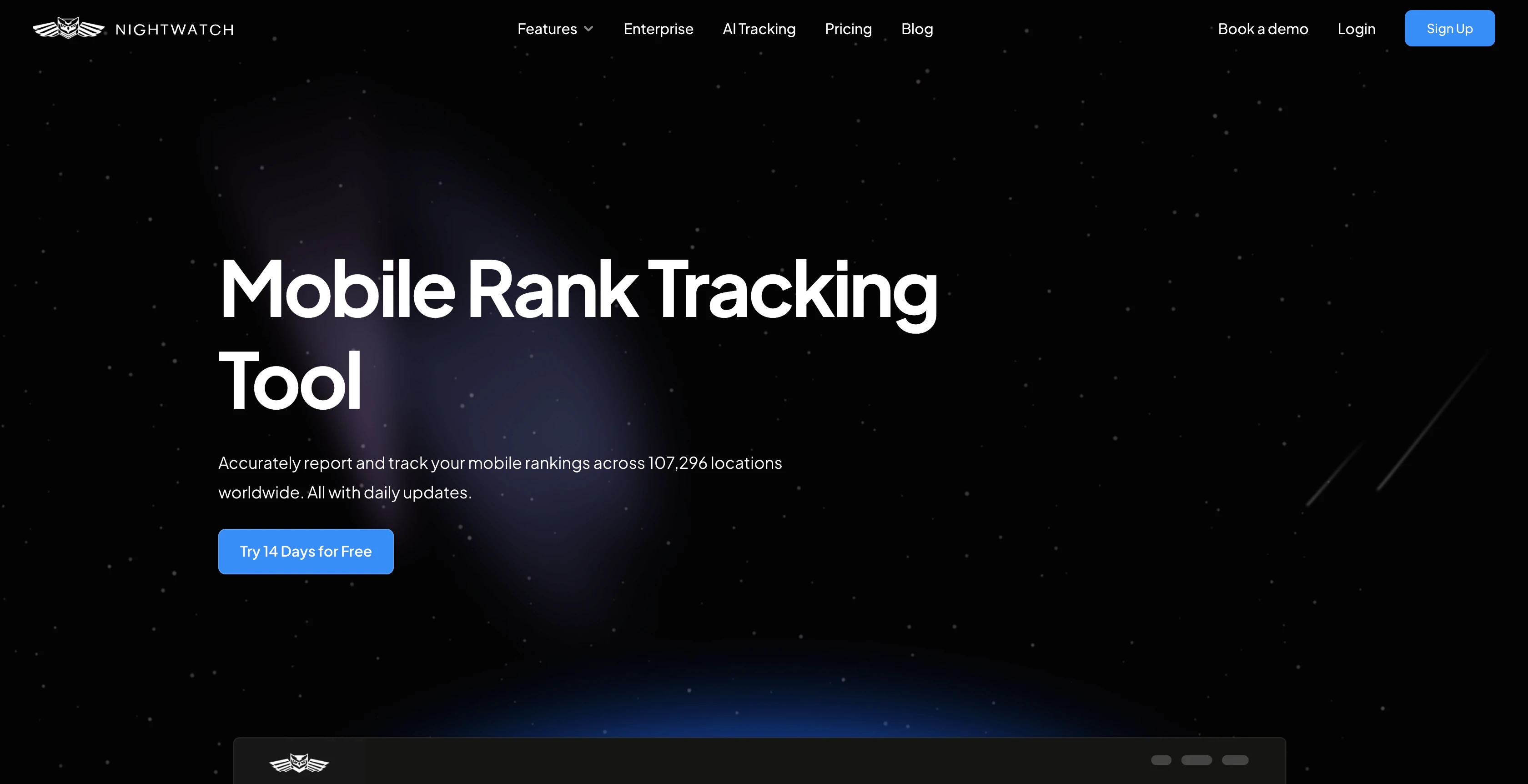Mastering Mobile Keyword Tracking
How often do you track your mobile rankings?
Mobile search is the holy grail for ambitious brands.
This is because nearly 60% of global searches now happen on smartphones, making mobile your gateway to capturing hearts, minds, and, let’s not forget, wallets.
If your brand isn’t showing up near the top, you’re missing out on precious digital traffic.
But how do you know if your site is showing up on the first page of mobile Google searches?
The simple solution is using a mobile keyword tracker.
If you haven’t been paying attention to your mobile keywords, don’t worry. This article will show you exactly how.
What is a Mobile Keyword?

A mobile keyword is simply a search phrase used on a search engine made from a mobile device.
When tracking mobile keywords, you are interested in mobile-specific keyword data (rankings, difficulty, volume, traffic).
Breaking it down:
- Strategic targeting: You select relevant keywords based on what your target audience will likely search for on mobile devices. This involves understanding search intent and tailoring your content accordingly.
- Location matters: Location-based search is huge on mobile keyword rankings. Including city names, neighborhoods, or landmarks in your keywords can give you a local edge.
- Mobile-Focused Optimization: Unlike desktop searches, mobile keywords often require concise and to-the-point optimization. You aim to capture the essence of user queries with succinct keyword choices.
- Responsive Content: Crafting content that fits into the mobile user experience is crucial. Your mobile keywords should guide you in creating discoverable, engaging, and user-friendly content on mobile devices.
- Analytics and Adaptation: Tracking the performance of your mobile keywords is a vital part of your toolkit. Using analytics tools, you assess the performance of your chosen keywords and adjust your strategies accordingly.
For you as a digital marketer, a mobile keyword is more than just a search term. It’s your strategic tool for shaping content strategy and enhancing your brand’s visibility. It ensures your brand’s online presence resonates with the mobile-savvy audience.
Why Tracking Your Mobile Keyword Ranking Matters
Keeping a vigilant eye on your mobile keyword rankings is more than a routine task – it’s a strategic necessity. Here’s why it matters:
1. Mobile Search Intent
Nailing search intent is a must for landing your content on the first page of Google. You identify search intent by reviewing the top pages in the SERPs. The thing is, the SERPs are different depending on the device used to search. By reviewing and tracking keywords for mobile and desktop independently, you can create content that aligns with what users seek on each platform. By doing this, you will improve the helpfulness of your content, resulting in better rankings.
2. Mobile Competitor Analysis
As mentioned previously, the search intent of keywords can be different for mobile and desktop. As such, your competitor analysis needs to cover both mobile and desktop SERPs. Since the majority of Google traffic is from mobile devices, being able to compare your mobile keyword rankings with competitors is essential. Your competitors on desktop might not be comprehensive, so knowing your mobile competitors enables you to run your SEO campaigns more effectively.
3. SEO Client Reporting
This one is a game changer if you run an SEO agency. Providing reports that give your clients an extra level of visibility can showcase the value of your services more effectively. Tracking both desktop and mobile keyword rankings helps you do this. By tracking keywords on both mobile and desktop, you can illustrate how your services have helped your client’s ranking improve, broken down by device. These extra details set you apart from the generic SEO service providers.
4. Determine If Your Content Is Optimized For Mobile
There are several ways you can evaluate the mobile-friendliness of your content. Tracking your mobile rankings and comparing them to your competitors is one of those. There are numerous variables regarding SEO, like search intent, quality of the content, links, authority, etc. Tracking your desktop and mobile rankings allows you to see if you are executing these correctly. Since mobile and desktop rankings can be different, it is not sufficient to only monitor one of the search mediums.
By tracking your mobile rankings you can determine if your content is optimized for mobile search. Do this by checking if your mobile keyword rankings are improving. If they are, great! Continue to build links and perform content updates to keep the momentum going. If not, ensure your search intent is aligned with the top-ranking articles on the mobile SERPs, improve your on-page SEO, and build links.
Tracking your mobile keyword rankings helps you navigate the twists and turns of the mobile world. It lets you tweak your content game and ensure your brand’s mobile device presence is impactful and enduring.
Choosing Your Mobile Rank Tracking Tool
Unlocking mobile SEO mastery starts with the right tool in your arsenal. But with so many contenders, how do you choose? See the critical criteria for selecting the best mobile rank checkers:
1. Mobile-Friendly Features
First, check if the tool is waving the mobile-friendly flag. Your tool should be fluent in the language of mobile searches. Seek out features crafted explicitly for mobile rank tracking. It’s not just about tracking – it’s about understanding and optimizing for mobile user behavior.
2. User-Friendly Interface
Complicated dashboards aren’t it. Opt for a tool that welcomes you with an intuitive and user-friendly interface. You want to analyze data rather than decipher how to access it.
3. Accuracy
Your mobile rank checker should be accurate and reliable. A tool that provides reliable results ensures you’re making decisions based on solid ground. Check for reviews, testimonials, or credibility badges to ensure you’re on the right track.
4. Customization Options
One size doesn’t fit all. Your business is unique, and so are your tracking needs. Look for a tool that lets you customize tracking settings. Your ideal tool should let you customize your tracking settings from specific mobile devices to targeted locations. Having control over your tracking parameters ensures a personalized experience.
5. Real-Time Updates
Choose a mobile keyword rank checker that provides real-time updates. This way, you’re always in the loop and ready to adapt to any changes in the mobile landscape.
6. Integration Capabilities
Your mobile rank tracker should not be an island. It should play well with others. Check if it integrates smoothly with your existing tools and platforms. A harmonious integration means a smoother workflow and less hassle for you.
7. Cost-Effective Solutions
Budgets matter and your tool shouldn’t break the bank. Look for cost-effective options that align with your needs. Some tools offer free trials – take advantage of these to ensure the tool feels like a good fit before committing.
There you have it, the roadmap to selecting your mobile rank-tracking sidekick. Now, which rank-tracking tool offers all this and more? Nightwatch is that rank tracker that checks all the boxes above.

Pro Tips: Best Practices for Mobile Keyword Ranking in 2026
Now that you have the tool, let’s polish your mobile SEO game with some winning tips:
- Localize, Localize, Localize: For local SEO you want a mix of geo-relevant and service-specific content to ensure search engines know what you offer and where you are located. Think like a neighborhood friend. Include city names, landmarks, and even street addresses in your content. Claim the top mobile Google My Business listing to get your business in front of more customers.
- Content is King: Remember, mobile users have short attention spans. Keep your content concise, engaging, and visually appealing. Focus on providing value to the reader and answering search intent.
- Embrace Voice Search: Talk it out! Optimize your content for conversational keywords and natural language queries using NLP tools like Surfer SEO or Page Optimiser Pro.
- Mobile Speed Matters: Optimize for quick loading times because nobody likes a laggy phone experience. Ensure your website loads in 3 seconds or less. Use SEO tools like Google PageSpeed Insights to identify and fix any speed bumps.
Over to You!
You’ve reached the summit of mobile rank tracking knowledge. Now, it’s time to put everything into action and claim your place at the top of the mobile SERPs.
Remember tracking mobile keywords is a must if you want your SEO campaign to be robust. It enables you to create more relevant content and gives granular visibility into SEO performance.
Using a mobile keyword tracking tool like Nightwatch makes the process effortless, so you don’t have to spend hours scrolling through Google on your phone to see where your content is ranking.
Click here to begin tracking your mobile keywords today.
About the author
Julian Lankstead is the founder of ClickPioneer & JulianLankstead.com. He helps businesses acquire customers using cutting-edge digital marketing techniques.
